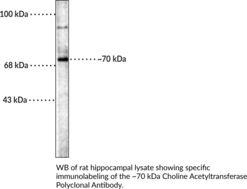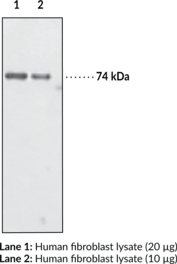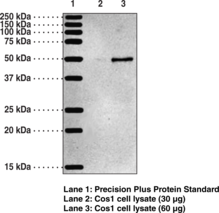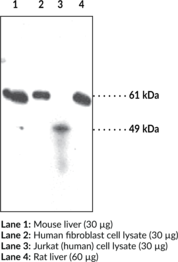Description
Choline acetyltransferase (ChAT) is an acyltransferase that catalyzes the synthesis of acetylcholine from acetyl coenzyme A (acetyl-CoA; Item No. 16160) and choline.{55140} It is composed of a catalytic domain flanked on both sides by a substrate binding domain.{55140,55145} ChAT is synthesized in the soma of cholinergic neurons in the central and peripheral nervous system and is transported to nerve terminals where it exists in a soluble form or on synaptic vesicles in a membrane-bound form.{55140} It is used as a marker of cholinergic neurons.{55141} Genome-wide deletion of Chat in mice is perinatal lethal.{55142} Intracerebroventricular transplantation of human HB1.F3 neural stem cells overexpressing CHAT reverses learning and memory deficits in a mouse model of Alzheimer’s disease induced by kainic acid (Item No. 78050).{55143} ChAT activity is reduced in a number of neurodegenerative disorders, including Alzheimer’s disease, amyotrophic lateral sclerosis (ALS), and Huntington’s disease.{55140} SNPs in CHAT are associated with Alzheimer’s disease in humans.{55144} Cayman’s Choline Acetyltransferase Polyclonal Antibody can be used for immunohistochemistry (IHC) and Western blot (WB) applications. The antibody recognizes ChAT at approximately 70 kDa from human, avian, chicken, guinea pig, mouse, non-human primate, and rat samples.
Synonyms: ChAT
Immunogen: Recombinant human choline acetyltransferase
Formulation: 100 µl affinity-purified polyclonal antibody
Isotype:
Applications: IHC and WB
Origin:
Stability: 365 days
Application|Immunohistochemistry||Application|Western Blot||Product Type|Antibodies|Polyclonal Antibodies||Research Area|Cell Biology|Cell Signaling||Research Area|Neuroscience|Behavioral Neuroscience|Learning & Memory||Research Area|Neuroscience|Neurodegenerative Disorders|Alzheimer’s Disease||Research Area|Neuroscience|Neurodegenerative Disorders|Huntington’s Disease




